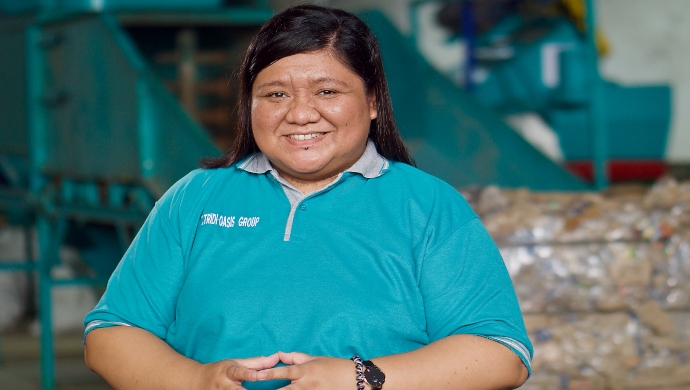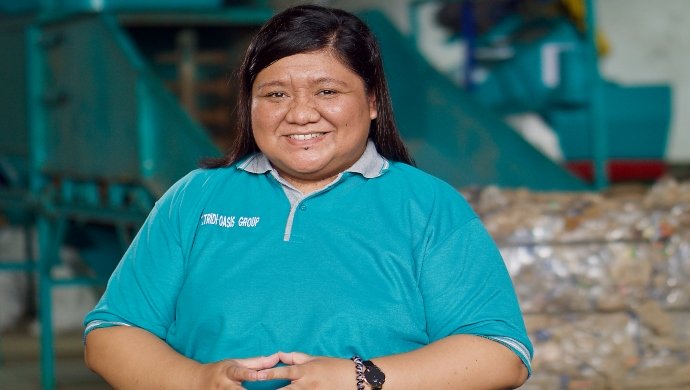Dian Kurniawati and Dinda Utami Ishlah had been researching on the recycling industry in Indonesia since 2014. The duo wanted to build a business that involved business and environment.
In 2014, the pair incorporated Tridi Oasis but the business didn’t kick off operations until 2017.
“Indeed, I was serious about the recycling industry for many long years before we started Tridi,” Dian Kurniawati, CEO and CFO of Tridi Oasis, said. “I had already set my eyes set on this industry since 2011 when I got serious about joining a business planning competition.”
Coming from an Engineering and Management educational background, Kurniawati developed social and environmental interest out of passion. She met her future co-founder Dinda Ishlah (COO) when they both were working in an oil and gas company.
“When we started out, there was next-to-no awareness about plastic waste management or how far it polluted the environment. It was harder and tech startups were the hotshots in getting funding. On top of that, we were often being questioned for being in the industry at such a young age and being females in a male-dominated industry,” Kurniawati recalled.

 Dinda Utami Ishlah, Co-founder and COO of Tridi Oasis
Dinda Utami Ishlah, Co-founder and COO of Tridi OasisFrom waste to opportunity
The company is a classic case of passion proceeding knowledge and background that we all came to know and love, as the duo had no background in the environmental business whatsoever.
“We financed everything on our own at first. We tested and experimented with different plastics, we also tried to find the demand and to implement the right business model, up until we decided to focus on plastic bottle wastes,” Kurniawati recalled. “We also Googled everything back then.”
Now, the startup introduced recycling PET as its main product. PET is Polyethylene Terephthalate, a raw material made of plastic bottles in a form of flakes.
“These flakes can be made into a polyester textile fibre, which is then turned into yarn for clothing or shoes (like Nike which makes shoes made of plastic bottles),” Kurniawati explained. “Besides that, they can also be turned into a new packaging or a material to stuff dacrons.”
It’s a never-ending cycle for their products and that’s exactly what they aimed for — to produce something that has a circular life to it.
“We usually sourced our plastic bottles from the trash collectors and people who buy the plastic bottles from manual scavengers, sort it out to resell to bigger collectors with the machine to press all the plastic bottles to be ready to process. Sometimes, we also source directly from restaurants, schools, landfills and waste banks in housing complexes,” Kurniawati shared.
Pre-COVID-19, the company also regularly did a beach cleanup, not only for environmental awareness but to get plastic bottles that they needed. “We set up a beach cleanup organisation based in Jakarta to do it regularly alongside four other organisations,” she recalled.
After collecting all these bottles, Tridi Oasis then uses a certain machine in its facility that turns these plastic bottles into flakes, ready to be sold again to their customers (less than five currently as they’re selling in bulk).
Creating demand to solve waste problems
Plastic pollution is a huge cause for concern for Indonesia: it is the second-largest contributor of ocean plastics in the world. Its current waste management systems are not adequate to handle the large amount of waste generated, especially with plastic consumption expected to continue to increase amid the population and economic growth.
Indonesia is “monumentally” a laggard when it comes to waste management — at least that’s what Kurniawati thought when asked on what the country needs to do more to catch up with the rest of the world.
Kurniawati further emphasises on the importance of having government-imposed waste management. “We think it would make a difference if the government is involved in the imposing of mandatory recycling, like making sure that every product with packaging that contains plastic must have a recycling content of x and x per cent; this in effect can create demand,” said Kurniawati.
The demand that Kurniawati meant will benefit all parties involved, like the recycling companies of Tridi Oasis’ league. “With the government’s regulation on this matter, companies that still use plastics will need to partner with recycling companies so that they can adhere to the regulation to recycle their production waste. The sense of responsibility needs to be built and maintained,” said Kurniawati.
Beyond plastic
For the bigger picture, Kurniawati added, the country needs to start by carefully mapping and getting to the roots of the waste problem. “It can also be done by really thinking about where the problems lie with plastic use, not simply eliminating it,” she said.
What Kurniawati meant is how the country needs to think about why the plastic is needed, how plastic can be valuable, and what kind of plastic management required from the production down to how it can be reused again to ensure there’s next to zero waste.
“The problem lies in the inability to think beyond the plastic. The lack of understanding and awareness to simply put trash in the trash can as a start, so every waste can be managed accordingly instead of scattered around. Look at Japan, they still use plastic on daily basis and is recorded to be country with the highest use of plastic, but the people are aware enough that they need to do their bid in collecting their plastic waste and drop it in the recycling centre for the plastic to be available,” said Kurniawati.
Indonesia definitely can learn from the way Japan handles plastic waste instead of blindly banning plastic use.
Tridi Oasis’s next move
Circulate Capital, a Singapore-based investment firm, recently announced a combined investment of US$6 million in Tridi Oasis and another recycling company in India via its Circulate Capital Ocean Fund (CCOF), which is dedicated to the ocean plastic crisis in South and Southeast Asia.
Speaking of the investment, Kurniawati said that the funding will be used for relocation to a better facility for production and to increase their capacity.
“Circulate Capital is not only providing funding but also network and market access. They also take the role of becoming an operational advisor to help our operation be more efficient,” she added.
The next move is to diversify to other types of plastics. “In December 2019, we received a grant from the Korean Government Agency which we used for research in recycling multilayered plastic sachet waste. Why we chose sachet waste because it’s really hard to recycle and it’s everywhere,” Kurniawati shared.
“We have found a way to turn the sachet waste into something more valuable,” she added.
Source: e27











